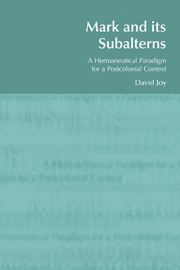Book contents
- Frontmatter
- Contents
- Foreword
- Acknowledgements
- 1 General Introduction
- PART I Hermeneutics: General Methodological Considerations
- PART II Mark – Context and Interpretation
- 4 Colonial Powers and their Marks in Mark
- 5 Mark and its Subalterns: A Product of Conflict and Resistance?
- 6 Mark 10:17–31 in the Light of the Issues of the Poor and their Representation: A Postcolonial Reading
- 7 Mark 7:24–30 in the Light of Race, Gender and Hybridity: A Postcolonial Reading
- 8 Mark 5:1–20 in the Light of the Issues of Class, Nationalism and Subalternity: A Postcolonial Biblical Reading
- 9 General Conclusions: Hermeneutical Issues and Concluding Summary
- Endnotes
- References
4 - Colonial Powers and their Marks in Mark
from PART II - Mark – Context and Interpretation
- Frontmatter
- Contents
- Foreword
- Acknowledgements
- 1 General Introduction
- PART I Hermeneutics: General Methodological Considerations
- PART II Mark – Context and Interpretation
- 4 Colonial Powers and their Marks in Mark
- 5 Mark and its Subalterns: A Product of Conflict and Resistance?
- 6 Mark 10:17–31 in the Light of the Issues of the Poor and their Representation: A Postcolonial Reading
- 7 Mark 7:24–30 in the Light of Race, Gender and Hybridity: A Postcolonial Reading
- 8 Mark 5:1–20 in the Light of the Issues of Class, Nationalism and Subalternity: A Postcolonial Biblical Reading
- 9 General Conclusions: Hermeneutical Issues and Concluding Summary
- Endnotes
- References
Summary
Introduction
In the previous chapter, the nature of postcolonial biblical hermeneutics was discussed and in this chapter the study moves its attention to the Gospel of Mark. Mark's Gospel seems to set up a conflict between the groups and individuals belonging to various sociopolitical and religiocultural categories of that time. For instance, the dissidence and resistance of the Galilean native community to Roman colonialism seems to be implicit in this Gospel. It is basically evident on two fronts: (i) Mark displays a sympathetic attitude towards despised employees, specifically tax collectors and toll collectors, and (ii) Mark is very critical of the Roman policies and domination. Therefore it is hoped to understand the structural details of Galilean society under Roman rule. Galilee becomes a launching-pad for study, as Mark's fundamental localics seems to be in and around Galilee and its socioeconomic movements. It is expected that a study of the colonial elements in Mark will appropriate the identity of the subalterns in Mark, more specifically the voiceless and marginalized who were members of the movement of Jesus in Galilee.
Mark clearly bears the marks of imperialism, as Palestine (and eventually Galilee too) experienced many imperial systems and practices. Palestine had a long history of subjugation to foreign empires as the province was occupied by many imperial rulers namely the Aramaens, Assyrians, Babylonians, Persians and Romans (Ahlstrom, 1994: 12). The long and uncompromising rule by foreign empires created an atmosphere of alienation, encroachment and repression.
- Type
- Chapter
- Information
- Mark and its SubalternsA Hermeneutical Paradigm for a Postcolonial Context, pp. 63 - 81Publisher: Acumen PublishingPrint publication year: 2008

